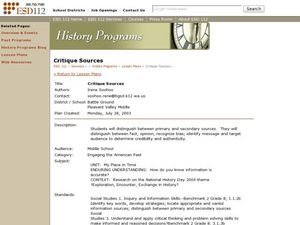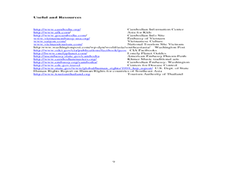Channel Islands Film
First Contact: Lesson Plan 4 - Grades 5-6
After watching Treasure in the Sea, a documentary about Channel Islands National Park and the video First Contact, about the voyage of Juan Rodríguez Cabrillo to the Channel islands, groups research and then compare the...
Personal Genetics Education Project
Protecting Athletes with Genetic Conditions: Sickle Cell Trait
Should school and professional teams test athletes for sickle cell trait? Will it protect them by providing knowledge or lead to discrimination by not allowing them to participate in sports? After learning about this genetic disorder,...
Speak Truth to Power
Dalai Lama: Free Expression and Religion
How is religious freedom connected to the conflict between China and Tibet? After reading an online passage of background information, your learners will divide into groups and both read and view an interview with the Dalai Lama. They...
Speak Truth to Power
Elie Wiesel: Speaking Truth to Genocide to Power
Invite your learners to discover the efforts of Night author Elie Wiesel to promote awareness of genocide in the world. After watching and reading an interview of Elie Wiesel, high schoolers work to create a living Holocaust...
Civil War Trust
Civil War Play
Raise the curtain to a class play that depicts the Civil War through both factual information and literary devices. The performance showcases the Battle of Antietam (Battle of Sharpsburg) and brings attention to women's roles,...
National Endowment for the Humanities
George Washington: The Precedent President
Everyone knows that George Washington was the first president, but do your scholars know why that was so important? The lesson plan, the third in a sequence of three, allows learners to understand how George Washington set a precedent...
iCivics
Drafting Board: Interest Groups
Does the influence of interest groups harm a political system? Your class members will analyze the role of interest groups in American politics, as well as consider the effect of perspective, bias, loyalty, and the...
Carolina K-12
Affrilachia
What makes a culture unique? Learners research life in the Appalachia region of the United States. Poetry, music, and oral history create Affrilachia, the term used to describe the lifestyle of the area. African-American mountain culture...
Curated OER
Fighting Disease
Seventh graders explore the concept of medical intervention in African nations. In this geography lesson, 7th graders research primary and secondary sources in search of information regarding Guinea worm disease. Students use their...
Curated OER
Earthquake Waves
In this waves worksheet, students read about the different types of waves associated with earthquakes. Then students complete 1 fill in the blank and 2 short answer questions.
Curated OER
Ecological Succession in Pond Water Cultures
Students collect samples of pond water, dried grass, and soil in a jar. They predict the order of ecological succession in their pond water cultures. They compare their expected results with their observed results.
Curated OER
Critique Sources
Pupils distinguish between primary and secondary sources. They study about fact, opinion, and recognize bias. Students find out if information is accurate or not and report on it. For the final project pupils create an annotated...
Curated OER
Market Research
High schoolers examine the difference between primary and secondary market research. They discover the limitations on marketing strategies. They explain the importance of having more research done before marketing decisions are made.
Curated OER
Roughing It in the Backwoods
Young scholars have the opportunity to practice research and essay-writing skills using primary and secondary source materials. They explore aspects of early settlers' lives in the backwoods of Upper Canada.
Curated OER
World War I: Letters from the Front
Students reesearch life on the home front and the front lines during World War I. They use primary and secondary sources to write letters. Students role-play as soldiers writing letters home and then assume the role of the person...
Curated OER
Why the US Fought and Lost the Vietnam War
Students examine the role of the United States in the Vietnam War. For this Vietnam War lesson, students research primary and secondary sources to find out why the United States was involved in the war and why it was unsuccessful in the...
Curated OER
Child Labor in America
Students interpret historical evidence presented in primary and secondary sources. In this child labor lesson, students examine the issue of child labor and determine how citizen action prompted...
Curated OER
Exercise and Muscles
Eighth graders identify and label the primary and secondary muscles used to perform an exercise. Students perform an exercise on a weight machine to figure out which muscles are being used. Students illustrate the muscles used by...
Curated OER
The Art of Paraphrasing
Tenth graders participate in an activity in which they practice paraphrasing sections of primary and secondary documents. They are to share their paraphrasing with the class to help with their confidence speaking in front of a group.
Curated OER
Conspiracy Theory: Lincoln's Assassination
Students determine how the Lincoln assassination impacted the United States. In this conspiracy theory lesson, students examine selected primary sources and chart the information they gather from the sources.
Curated OER
From the Source to the Sea: The Nisqually River Watershed
Students research the conflicts over different uses of the Nisqually River resources and role play as mediators between Chief Leschi and other interested parties. They cite and interpret relevant artifacts and primary and secondary...
Curated OER
An Introduction To Southeast Asia Today
Students investigate the region of Southeast Asia. They research the history, geography, and spread of ethnicity throughout the region. The various lessons consist of class discussion and group work to find common themes shared in...
Curated OER
Give Me Liberty
Young scholars define the term "liberty." They explore the concept of liberty in our nation's history and how it is reflected throughout our rich culture. Students connect the office of the presidency to our nations' development and its...
Curated OER
America 2000: Federal Round Table Discussion
Eighth graders examine the United States Constitution and identify the beliefs and values Americans follow today. In groups, they compare and contrast state's rights and federal rights and the issues affecting them. They debate the...























